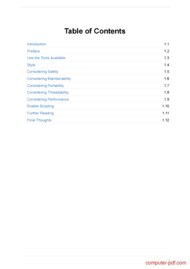C++ Best Practices
In the world of professional C++ development, writing functional code is only half the battle—crafting maintainable, efficient, and robust software requires disciplined adherence to proven best practices. This comprehensive C++ Best Practices guide serves as both a tutorial and forkable coding standards document, offering actionable recommendations that bridge the gap between theoretical knowledge and real-world application. Unlike generic programming books, this resource delves into the practical nuances often overlooked in popular titles like Effective C++, providing specific guidance on everything from error handling to multithreading that you can immediately apply to your projects.
Learning the C++ Best Practices
The guide begins by establishing why coding standards matter, demonstrating how consistent style and thoughtful design decisions prevent bugs and reduce technical debt. The Style chapter goes beyond basic indentation rules, offering nuanced advice on naming conventions, commenting strategies, and API design that make code self-documenting. Particularly valuable are the discussions around header organization and include guards—small details that significantly impact large codebases. These foundational chapters equip developers with the tools to write code that's not just understood by compilers, but also by teammates and future maintainers.
A standout section addresses safety and error handling, a critical yet frequently neglected aspect of C++ programming. The guide provides modern approaches to exception safety, resource management (RAII), and input validation that prevent common vulnerabilities and crashes. Equally important is the Maintainability chapter, which presents strategies for unit testing, modular design, and documentation that keep projects adaptable over time. These chapters shine by offering concrete examples of anti-patterns to avoid alongside preferred solutions, making the advice immediately applicable during code reviews.
For developers working on cross-platform or performance-sensitive applications, the Portability and Performance chapters deliver exceptional value. The guide explains how to leverage the Standard Template Library (STL) effectively while avoiding platform-specific pitfalls, and provides data-driven optimization techniques that go beyond guesswork. The Threadability section is particularly relevant in today's multicore world, offering clear guidelines for thread-safe design, lock hierarchies, and atomic operations without falling into common parallelism traps. These advanced topics are presented with an emphasis on practical tradeoffs rather than academic perfection.
The guide distinguishes itself further with forward-thinking chapters on tooling and scripting integration. It catalogs essential developer tools—from static analyzers to profilers—and demonstrates how to incorporate them into your workflow for continuous quality improvement. The scripting chapter opens doors to extending C++ applications through languages like Python, showing how to expose functionality while maintaining type safety and performance. These sections reflect the reality that modern C++ development rarely happens in isolation.
What makes this resource truly exceptional is its living document approach—structured as a forkable standard that teams can adapt to their specific needs. The Further Reading section curates essential resources for deepening your C++ expertise, while the conclusion ties together how these best practices compound to create professional-grade software. Whether you're onboarding new team members, establishing coding guidelines, or refining your own skills, this guide provides the missing manual for C++ development at scale. In an ecosystem where it's easy to write working code but hard to write good code, these best practices represent the difference between a hobbyist and a professional.
| Description : | Boost your C++ skills with 'C++ Best Practices' PDF tutorial. Download now for free and learn advanced coding techniques, style, safety, maintainability, and more. |
| Level : | Beginners |
| Created : | December 11, 2016 |
| Size : | 281.59 KB |
| File type : | |
| Pages : | 43 |
| Author : | Jason Turner |
| Licence : | Creative commons |
| Downloads : | 4866 |
